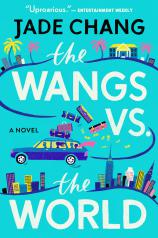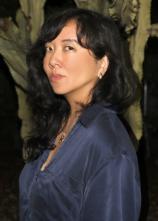Interview: October 7, 2016
Jade Chang is a former arts and culture journalist, whose debut novel, THE WANGS VS. THE WORLD, is a hilariously subversive immigrant story about a wealthy but fractured Chinese family that had it all, only to lose every last cent --- and about the road trip they take across America that binds them back together. In this interview conducted by Carol Fitzgerald, the president and co-founder of The Book Report Network, Chang talks about her unique approach to a classic story type, how she enjoys finding humor in unexpected places, and the surprising way she was able to research the Wangs’ cross-country adventure.
Bookreporter.com: What was the catalyst for your writing THE WANGS VS. THE WORLD?
Jade Chang: I just really wanted to write an immigrant novel that was a sort of rebellion against the traditional immigrant novel. I loved many of those books, of course, but I was interested in writing about immigrants and people of color who are not struggling to fit in or feeling like outsiders. Instead, I wanted to tell the story of immigrants who see themselves as absolutely central to the story of this country.
BRC: The book is set as a cross-country odyssey for the Wangs. This sets the stage for a close interaction among them, which is not always smooth and pleasant. Why this trip? And why did you have them take the southern route when they were headed towards upstate New York?
JC: The southern route has all of the US cities that especially fascinate me! In particular, I really wanted them to go to New Orleans.
BRC: Have you been to all of the locations that the Wangs visit? If not, how did you research them?
JC: I've been to most of them, but I've never actually done a continual drive along that route. As for research, it turns out there's an entire subculture of long haul truckers who post dashboard videos of their routes! I watched a lot of them.
BRC: Charles Wang always has a plan; he is an optimist and moving ahead, whether it makes more sense to stop rather than keep going. There’s always a new idea, a new scheme. Was anyone in particular a model for Charles?
JC: Thanks for seeing my favorite part of Charles! Hmm...there were a few inspirations, but I'm not sure I should reveal their identities!
BRC: Is it hard to write a character who is clearly setting a course for his life to implode, especially as he is part of a culture that is generally focused on success?
JC: Well, all writing is kind of difficult, but I think that writing a character who is on the precipice is really thrilling --- it's his existence at that point of contrast with the surrounding culture (and his own past) that really interests me.
BRC: There are in-depth descriptions of Saina’s art exhibits. Can the level of detail you achieved there be attributed to your background as a journalist covering arts and culture?
JC: Yes, and to my true love of conceptual art. It walks the line between the ridiculous and the profound.
BRC: In the world of pop culture, your star can be turned off in just a moment, which is what happens to Saina. How tough do you have to be to succeed as a creative personality?
JC: I think you have to possess a sense of recklessness and a sense of confidence --- pretty much in equal parts.
BRC: There are so many funny parts in the book --- some subtle, others rather blatant. Talk to us about the humor. What made you decide to incorporate it?
JC: Life is funny even in its saddest moments. To write about these characters fully, I had to include humor.
BRC: Charles’ first wife, May Lee, and his second wife, Barbra, share a birthday, which is just one of the funny moments in the book. Saina notes, “She can’t take Mommy’s birthday. That’s not fair.” In another section, there is a trip down memory lane about Beanie Babies. Did you have fun writing this kind of humor?
JC: Of course! I'm not sure how I'd go about classifying this kind of humor, but I definitely enjoyed it! I like finding the funny in unexpected connections!
BRC: At the heart of the book is a beautiful message about the importance of family, and how family needs to be there for one another, no matter what. Has anyone in your family read your book yet? If so, what was their reaction to it?
JC: Thank you! I do think that’s very true, and sometimes that's not the family that you're born into, but the family that you make. My sister has read the book in several drafts --- other members of my family...not quite yet.
BRC: There were a number of lines in Chinese with no translation. Why did you choose not to translate them for the reader? In what dialect are they written?
JC: The lines are a simplified pinyin version of Mandarin that I thought would give an American English speaker the closest experience to hearing it spoken. You know, everyone focuses on the untranslated Chinese, but really there are several untranslated languages in the book --- the mathematical formula, the fashion labels, the names of artists and comedians. If you know the things being referenced, it hopefully deepens your experience, but if you don't, you can still get almost everything out of it!
BRC: Which character was easiest to write, and which was the most challenging?
JC: Barbra was surprisingly easy to write. I think from the outside she seems like a cipher, but she possessed a restraint and elegance that made her a relief after some of the other, more intense Wangs! I probably did the most revision with Grace, though it was more about trying to help readers truly understand her emotions.
BRC: What are you working on now, and when can readers expect to see it?
JC: I'm working on another novel, but who knows when it will be done.




